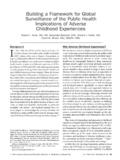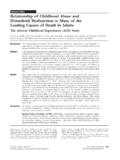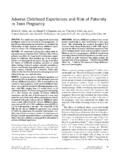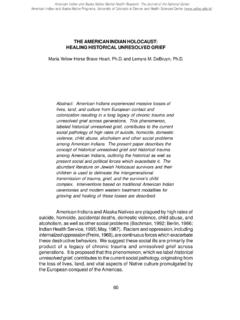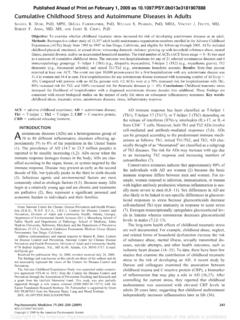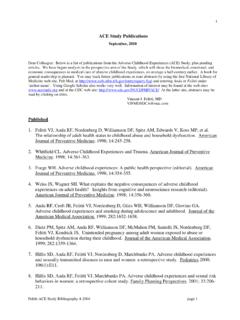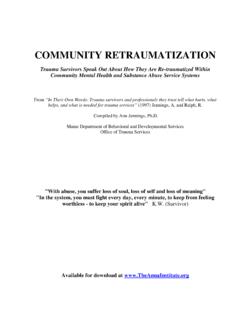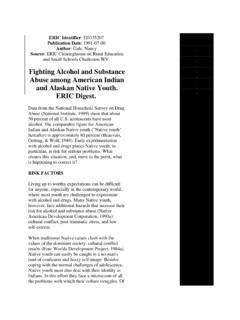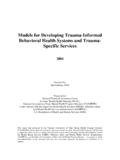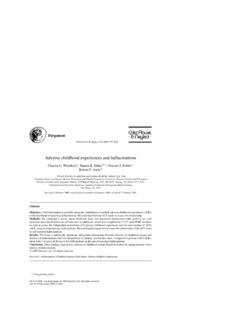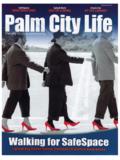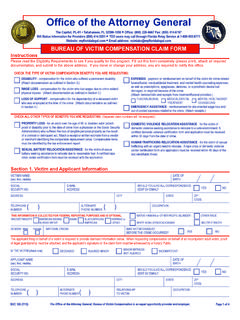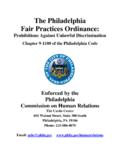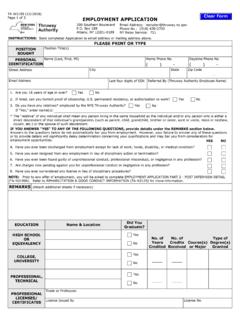Transcription of Adverse Childhood Experiences, Alcoholic Parents, …
1 PSYCHIATRIC SERVICES August 2002 Vol. 53 No. 811000011An estimated 25 percent of are exposed to alco-hol abuse or dependence inthe family (1). In the 1980s about 21million adults in the United Statesgrew up with an Alcoholic parent (2).As early as 1977, a lay movement toaddress this issue formally beganwhen the first meeting of Adult Chil-dren of alcoholics was convened toaddress the health and social prob-lems of this population (3,4). Al-though self-help groups and publica-tions subsequently flourished (5), sci-entific investigation of the health andmental health problems of adult chil-dren of alcoholics has not kept pacewith the development of lay recoveryprograms and literature (6).
2 Children living in families with al-cohol-abusing parents are more likelythan other children to have an unpre-dictable home life and to carry a bur-den of secrecy as a result of their at-tempts to hide the alcohol abuse fromothers (7,8). These children also havean increased risk of a variety of otheradverse Childhood experiences, in-cluding being abused or neglected,witnessing domestic violence, and be-ing exposed to drug-abusing, mental-ly ill, suicidal, or criminal householdmembers (9 20). The risk of alcoholism, psy-chopathology, and other medical andsocial problems has been reported tobe greater among adult children of al- Adverse Childhood Experiences, Alcoholic Parents, and Later Risk ofAlcoholism and DepressionRRoobbeerrtt AAnnddaa,, ,, WWhhiittffiieelldd,, FFeelliittttii,, CChhaappmmaann,, EEddwwaarrddss,, DDuubbee,, WWiilllliiaammssoonn,, Anda, Dr.
3 Chapman, Dr. Edwards, Ms. Dube, and Dr. Williamson are affiliated withthe National Center for Chronic Disease Prevention and Health Promotion of the Centersfor Disease Control and Prevention in Atlanta. Dr. Whitfield is in private practice in At-lanta, and Dr. Felitti is with the department of preventive medicine at Southern Califor-nia Permanente Medical Group (Kaiser-Permanente) in San Diego. Send correspondenceto Ms. Dube, Mailstop K-47, Centers for Disease Control and Prevention, 4770 BufordHighway, , Atlanta, Georgia 30341-3724 (e-mail, study examined how growing up with Alcoholic parentsand having Adverse Childhood experiences are related to the risk of al-coholism and depression in adulthood.)
4 Methods:In this retrospective co-hort study, 9,346 adults who visited a primary care clinic of a large healthmaintenance organization completed a survey about nine Adverse child-hood experiences: experiencing Childhood emotional, physical, and sex-ual abuse; witnessing domestic violence; parental separation or divorce;and growing up with drug-abusing, mentally ill, suicidal, or criminalhousehold members. The associations between parental alcohol abuse,the Adverse experiences, and alcoholism and depression in adulthoodwere assessed by logistic regression analyses. Results:The risk of havinghad all nine of the Adverse Childhood experiences was significantlygreater among the 20 percent of respondents who reported parental al-cohol abuse.
5 The number of Adverse experiences had a graded relation-ship to alcoholism and depression in adulthood, independent of parentalalcohol abuse. The prevalence of alcoholism was higher among personswho reported parental alcohol abuse, no matter how many Adverse ex-periences they reported. The association between parental alcoholabuse and depression was accounted for by the higher risk of having ad-verse Childhood experiences in Alcoholic families. Conclusions:Childrenin Alcoholic households are more likely to have Adverse experiences. Therisk of alcoholism and depression in adulthood increases as the numberof reported Adverse experiences increases regardless of parental alcoholabuse.
6 Depression among adult children of alcoholics appears to belargely, if not solely, due to the greater likelihood of having had adversechildhood experiences in a home with alcohol-abusing parents. (Psychi-atric Services53:1001 1009, 2002)coholics than among other adults(6,21 25). However, little epidemio-logic research has quantified the bur-den of the wide variety of adversechildhood experiences that are morecommon in Alcoholic families and, inturn, the effect of this burden on therisk of alcoholism and depressionamong adult children of address these questions, weused data from more than 9,300adults in a primary care setting whoparticipated in the Adverse childhoodexperiences study.
7 First, we examinedthe association between growing upwith one or more alcohol-abusingparents and nine Adverse childhoodexperiences. Because previous re-search has largely ignored the co-oc-currence of alcohol abuse in both par-ents (20), we describe these associa-tions according to whether the moth-er, the father, or both were alcoholabusers. Because the occurrence ofalcoholism and depression may be in-fluenced by both genetic predisposi-tions (26 31) and environmental fac-tors (3,4,7 20), we assessed how ad-verse Childhood experiences influ-enced the risk of alcoholism and de-pression among persons with andwithout a history of parental alcoholabuse.
8 MethodsSettingThe Adverse Childhood experiencesstudy was based at Kaiser Perma-nente s San Diego Health AppraisalClinic, where more than 50,000adults receive standardized examina-tions annually. The health appraisalsused at the clinic include completionof a standardized medical question-naire, a physical examination, and re-view of laboratory results with the pa-tient. All enrollees of the KaiserHealth Plan in San Diego are givenliterature about this free members are self-referred, andhealth care providers refer about 20percent of the clinic s patients. A re-cent review of membership and uti-lization records among Kaiser mem-bers in San Diego who were continu-ously enrolled between 1992 and1995 showed that 81 percent of those25 years of age or older had beenevaluated in the Health AppraisalClinic during this four-year interval.
9 ProceduresThe data reported here are from aretrospective cohort analysis of datafrom the larger study; the methods ofthe larger study have been reportedin detail elsewhere (9,10). The studywas approved by the institutional re-view boards of the Southern Califor-nia Permanente Medical Group(Kaiser Permanente), the EmoryUniversity School of Medicine, andthe Office of Protection from Re-search Risks of the National Institutesof Health. A total of 13,494 Kaiser HealthPlan members who completed stan-dardized medical evaluations at theHealth Appraisal Clinic between Au-gust 1995 and March 1996 weremailed the study questionnaire,which included questions aboutchildhood abuse and exposure toforms of household dysfunction whilegrowing up.
10 Those who did not re-spond to the first mailing received asecond mailing. The response rate forthe survey was percent (9,508members). We found no important differencesbetween respondents and nonrespon-dents in health risk behaviors, such assmoking, obesity, and substanceabuse, or in history of disease, such asdiabetes, hypertension, chronic lungdisease, cardiovascular disease, andcancer. Nonrespondents tended to besomewhat younger and to be fromracial or ethnic minority groups. Fur-thermore, after adjustment for differ-ences in age and race, the magnitudeof the relationships between a historyof sexual abuse and health behaviorsand outcomes was nearly identical forrespondents and for we found no evidence that re-sponse bias affected the direction orstrength of our estimates of the asso-ciation between a history of sexualabuse and behavioral and health out-comes (32).
